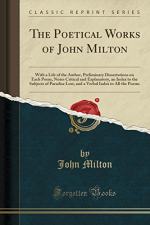|
This section contains 417 words (approx. 2 pages at 400 words per page) |

|
On Shakespeare Summary & Study Guide Description
On Shakespeare Summary & Study Guide includes comprehensive information and analysis to help you understand the book. This study guide contains the following sections:
This detailed literature summary also contains Quotes and a Free Quiz on On Shakespeare by John Milton.
The following version of this poem was used to create this guide: Milton, John. "On Shakespeare." The Major Works. Oxford, 2008.
Note that all parenthetical citations refer to the line number in which the quotation appears.
"On Shakespeare" was originally published under the title "An Epitaph on the Admirable Dramaticke Poet, W. Shakespeare" in the 1632 folio of Shakespeare's collected plays. Milton later changed the title to "On Shakespeare" in the 1645 edition of his collected poems. The original title, however, declares the sixteen-line poem an epitaph, which is a phrase or short meditation written to remember someone who has died. Epitaphs frequently appeared as short inscriptions on tombstones. Most epitaphs written as lyric poems, however, depart from this form and instead offer extended and often dramatic meditations on life that frequently digress from their original subject matter. Milton's "On Shakespeare" is no different, as the poem celebrates the late poet and playwright for his talent while also philosophizing the efficacy of poetry and hinting at Milton's own skill as a professional poet.
By the time Milton composed "On Shakespeare" in 1630, Shakespeare had already been dead for fourteen years. As such, his impact on English life and literature was well known. He was already considered a transformative figure of the early modern period – for his poetry, to be sure, but mostly for this plays and his impact on English Renaissance drama. Milton, by contrast, was just beginning his career as a poet. He graduated from Cambridge in 1629, and composed "On Shakespeare" in 1630. The poem was Milton's first to ever appear in print. Milton's early poetry features a dedicated interest in framing himself as one of the next great poets. In his 1637 pastoral elegy "Lycidas," he compares himself to Virgil and promises to follow in his footsteps.
In "On Shakespeare," Milton ponders the appropriate memorial for Shakespeare, wondering whether an elaborate tomb or pyramid would represent the bard's legacy. He decides that these burials are "weak witness" to Shakespeare's fame as a poet, suggesting that the real testament to Shakespeare's life lives within his readers' appreciation for his work (6). He goes on to say that while other poets labor to produce quality work, Shakespeare's words seemed to flow with ease. Everyone, Milton says, has been affected by Shakespeare's "unvalued book," so much so that his words paralyze his audience and turn them to marble (11-14). As the poem concludes, Milton suggests that even kings would be envious of this figurative "tomb" in which Shakespeare is buried (15-16).
Read more from the Study Guide
|
This section contains 417 words (approx. 2 pages at 400 words per page) |

|



